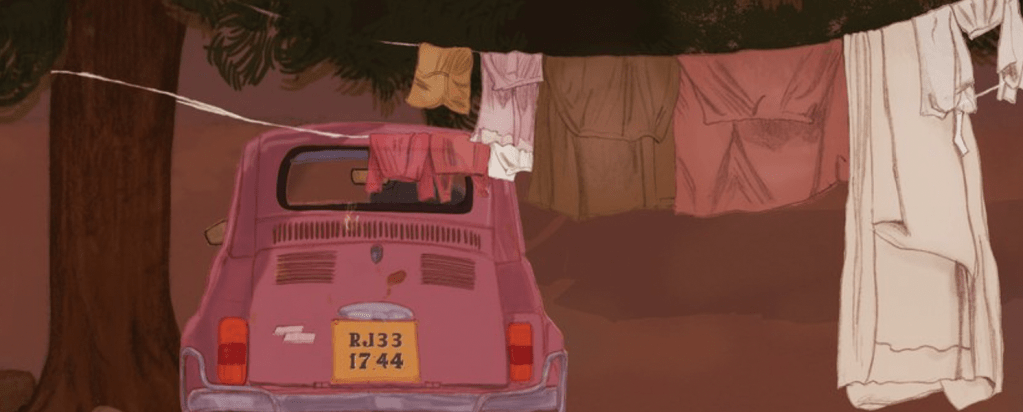Geetanjali Shree, Tomb of Sand, tr. Daisy Rockwell, Sheffield and London, United Kingdom: Tilted Axis Press, 2021, 735pp., £12.00.
Sometimes you start reading a book and know right away that you like it. Or that you don’t. But sometimes you begin reading and can’t quite make up your mind. This doesn’t necessarily mean that the book is mediocre; it can also happen when a book causes you to adjust your own internal standards for good literature. Sometimes, indeed, one gets to the end of a book and is still not entirely certain. If the book is short (and you’re sufficiently motivated), you can read it again. If it is 735 pages long, like Geetanjali Shree’s Tomb of Sand, you hope that you will make up your mind before you reach the end.
Shree, an Indian novelist writing in Hindi, is not exactly a household name. Although three of her previous novels had been translated into English, she was not widely known until she was announced in June as the winner of the 2022 International Booker Prize, one of the most prestigious literary awards, given annually to “the finest single work of fiction from around the world which has been translated into English and published in the UK and Ireland.” Indeed, when the prize was announced, it was almost impossible to get a copy of her novel, published by the small Tilted Axis Press, which specializes in “work by Asian writers, translated into a variety of Englishes.” By now, Penguin has jumped into the breach, taking advantage of Shree’s sudden prominence with a more readily available edition.
Fortunately, I did figure out what I thought of Tomb of Sand before the end. It is quite a good novel. It did, however, take me about 500 pages to make up my mind, and the book will not be to everyone’s taste. If you are looking for action, this is not the book for you. (As it apparently was not for several readers who have reviewed it on Amazon.) For about 200 pages, almost nothing happens except that an old woman, Ma, depressed after the recent death of her husband, lies feebly in bed while the rest of the family members worry about her and quarrel with one another.
Not that these pages are boring. On the contrary, Shree’s descriptions of family dynamics are delightful, as we see inside the minds of Ma’s son Bade, a retiring civil servant who tries to maintain an aura of patriarchal authority that is constantly undermined by his bickering with his wife; her daughter-in-law Bahu, who feels unappreciated for all the work she does caring for Ma; and Ma’s daughter Beti, looked on by the others with some suspicion for having broken free of their traditional mode of life and striking out as a self-consciously modern working woman.
One day, while no one is paying attention, Ma simply gets up out of bed, walks off, and vanishes. Her eventual reappearance at a police station, frail, hungry, and unable to explain where she has been, sets the stage for the novel’s second part (another 300 pages or so). Central to this section is the evolving relationship between Beti and her mother after the old woman moves into her daughter’s home. Beti’s independent life is interrupted as she takes on the role of caring for Ma, priding herself on how Ma begins to flourish once freed from the straitjacket of Bade’s more conventional household. Indeed, Ma appears to become younger and more free-spirited as she regains her strength.
Ma’s blossoming receives special impetus from her developing friendship with Rosie, a transgender woman who proves to have markedly distinct female and male personalities, along with a considerable zest for life. Beti, whom we ironically watch becoming more and more like her mother, is increasingly flummoxed by this; after all, she, not her mother, is supposed to be the bold, progressive woman in the family, but now Ma turns out to be the more interestingly feminist character of the two.
I confess that Shree almost lost me in this lengthy middle section (which ends in tragedy for Rosie). One episode in particular—involving a cyst that Ma develops, which emerges whenever she goes to the bathroom and has the appearance of a small phallus—threatened to carry the theme of transgenderism to an unnecessary level of political correctness. But when you’ve already read 500 pages, you have, as it were, a lot of sunk costs. So with some trepidation, I soldiered on.
And I was very glad that I did. The book’s final 200 pages are wonderful, and things do indeed begin to happen. Ma travels with Beti to Pakistan, a complicated endeavor given the tense relationship between the countries. In a series of unexpected plot twists, we learn that Ma is not simply traveling to Pakistan but is returning there, in search of a first husband whom she had lost in the violent partition of India, and whose existence, like Ma’s origin, had been completely unknown to her family. Further revelations about Rosie follow as well, and the book moves inexorably toward a conclusion that mingles joy and sorrow in equal measure. The final chapters include a romantic reunion that is not quite what one expects but nevertheless deeply moving. In ways that gain new layers of meaning when read against the current backdrop of war in Ukraine, the reader is prompted to reflect upon the vicissitudes and fragility, but also the tenacity, of human life and human love.
In some ways Tomb of Sand is an easy book to summarize: an old woman, after the death of her husband, gains a new lease on life and sets out to reconnect with her hidden past. The plot is simple, almost trite. But certain themes repeatedly recur. This is a book about relationships, about borders, and about stories. I noted earlier Shree’s humorous treatment of family relationships, especially between mother and daughter. Ma’s and Beti’s evolving roles constantly challenge easy preconceptions about what it means to be a modern woman or a feminist.
Similarly, the novel challenges the importance of borders. Lines blur not only between man and woman in the (perhaps too) obvious case of Rosie, but also between old and young, parent and child, animal and human, Hindu and Muslim, and of course Indian and Pakistani. Daisy Rockwell, in her translator’s note at the end of the book, places it in the category of “Partition literature,” explaining that “the traumatic events surrounding the 1947 Partition of India and Pakistan have led to an entire literary genre, on a scale similar to that of Holocaust literature.” Although much of this literature exists in English translation, little has “ever been published outside of South Asia”—an “enduring shame,” in Rockwell’s words, given the “far-reaching global consequences” of Partition, which gave rise to massive migration, displacement, and violence. Shree’s novel offers an indirect glance at the human suffering that resulted.
Finally, Tomb of Sand is a book about language itself and the stories we create. Even in translation, Shree’s use of language is extremely playful. Words morph gradually into their opposites, animals talk, the text is liberally sprinkled with Hindi words, and the narrator, who puts in a handful of unpredictable appearances, reflects repeatedly on the ways in which “things mostly happen just because.” We think we write the stories of our lives, but stories—including, crucially, our own—are always getting away from us and heading off under their own steam. “Here’s the thing,” writes Shree: “a story can fly, stop, go, turn, be whatever it wants to be.” Because of this inner vitality, “literature is a source of hope and life.” And it succeeds “when the tale of a dying woman evolves into a story about her thriving and flourishing, and [the dangerous region of] Khyber causes a matchless guileless love to blossom in full.”






Please note that we at The Dispatch hold ourselves, our work, and our commenters to a higher standard than other places on the internet. We welcome comments that foster genuine debate or discussion—including comments critical of us or our work—but responses that include ad hominem attacks on fellow Dispatch members or are intended to stoke fear and anger may be moderated.
With your membership, you only have the ability to comment on The Morning Dispatch articles. Consider upgrading to join the conversation everywhere.